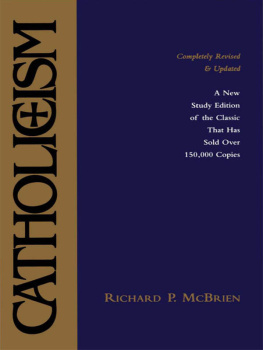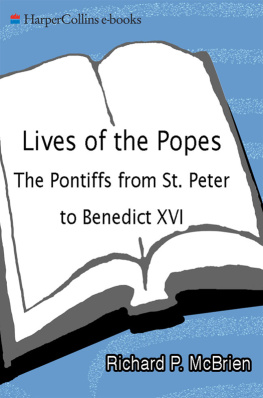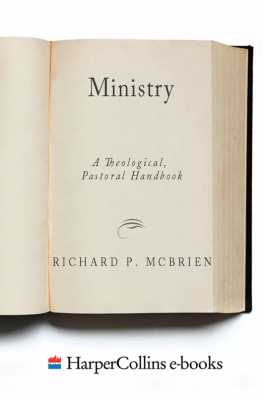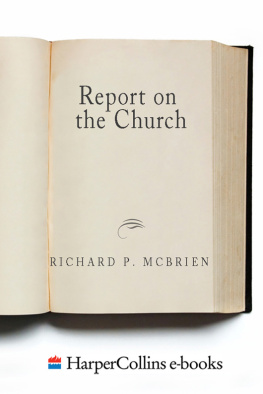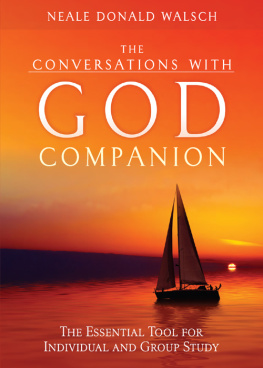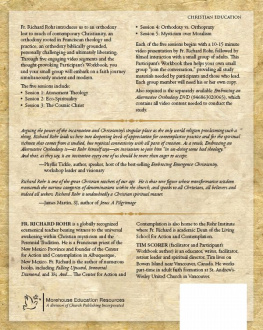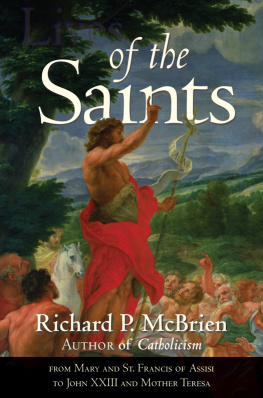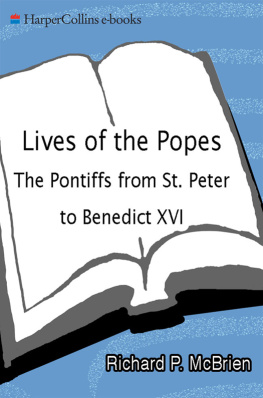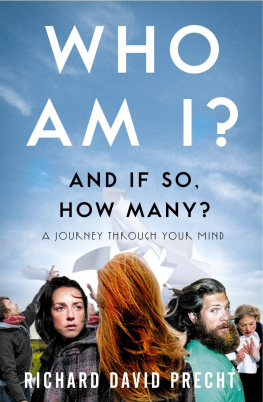Richard P. McBrien - Catholicism
Here you can read online Richard P. McBrien - Catholicism full text of the book (entire story) in english for free. Download pdf and epub, get meaning, cover and reviews about this ebook. year: 2013, publisher: HarperCollins, genre: Religion. Description of the work, (preface) as well as reviews are available. Best literature library LitArk.com created for fans of good reading and offers a wide selection of genres:
Romance novel
Science fiction
Adventure
Detective
Science
History
Home and family
Prose
Art
Politics
Computer
Non-fiction
Religion
Business
Children
Humor
Choose a favorite category and find really read worthwhile books. Enjoy immersion in the world of imagination, feel the emotions of the characters or learn something new for yourself, make an fascinating discovery.
- Book:Catholicism
- Author:
- Publisher:HarperCollins
- Genre:
- Year:2013
- Rating:5 / 5
- Favourites:Add to favourites
- Your mark:
- 100
- 1
- 2
- 3
- 4
- 5
Catholicism: summary, description and annotation
We offer to read an annotation, description, summary or preface (depends on what the author of the book "Catholicism" wrote himself). If you haven't found the necessary information about the book — write in the comments, we will try to find it.
Catholicism — read online for free the complete book (whole text) full work
Below is the text of the book, divided by pages. System saving the place of the last page read, allows you to conveniently read the book "Catholicism" online for free, without having to search again every time where you left off. Put a bookmark, and you can go to the page where you finished reading at any time.
Font size:
Interval:
Bookmark:

WHAT IS CATHOLICISM?
FAITH AND ITS OUTCOMES: THEOLOGY, DOCTRINE, DISCIPLESHIP
HUMAN EXISTENCE
THE HUMAN CONDITION TODAY
UNDERSTANDINGS OF HUMAN EXISTENCE
A THEOLOGY OF HUMAN EXISTENCE: NATURE, GRACE, ORIGINAL SIN
GOD
BELIEF AND UNBELIEF: THE SEARCH FOR GOD
REVELATION: GODS SELF-DISCLOSURE TO US
THE TRIUNE GOD
GOD: SPECIAL QUESTIONS
RELIGION AND ITS VARIETIES
JESUS CHRIST
CHRIST AND CONTEMPORARY CULTURE
THE CHRIST OF THE NEW TESTAMENT
THE CHRIST OF POSTBIBLICAL THEOLOGY AND DOCTRINE
THE CHRIST OF CONTEMPORARY THEOLOGY
SPECIAL QUESTIONS IN CHRISTOLOGY
THE CHURCH
THE CHURCH OF THE NEW TESTAMENT
THE CHURCH IN HISTORY
THE CHURCH OF THE SECOND VATICAN COUNCIL
THE CHURCH IN CONTEMPORARY THEOLOGY AND DOCTRINE
SPECIAL QUESTIONS IN ECCLESIOLOGY
THE SACRAMENTS
THE SACRAMENTS IN GENERAL
THE SACRAMENTS OF INITIATION: BAPTISM, CONFIRMATION, AND EUCHARIST
THE SACRAMENTS OF HEALING: PENANCE AND ANOINTING OF THE SICK
THE SACRAMENTS OF VOCATION AND COMMITMENT: MATRIMONY AND HOLY ORDER
CHRISTIAN MORALITY
CHRISTIAN MORALITY: A HISTORICAL PERSPECTIVE
FOUNDATIONS OF CHRISTIAN MORALITY
CHRISTIAN MORALITY: SPECIAL QUESTIONS
CHRISTIAN SPIRITUALITY
CHRISTIAN SPIRITUALITY
WORSHIP: LITURGY, PRAYER, DEVOTIONS
MARY AND THE SAINTS
THE LAST THINGS
CATHOLICISM: A SYNTHESIS
Caesas Coin: Religion and Politics in America
Church: The Continuing Quest
Do We Need the Church?
The HarperCollins Encyclopedia of Catholicism (general editor)
Ministry: A Theological, Pastoral Handbook
The Remaking of the Church
Report on the Church: Catholicism After Vatican II

Scripture quotations are from the New Revised Standard Version of the Bible, copyright 1989 by the Division of Christian Education of the National Council of the Churches of Christ in the USA. Used by permission. All rights reserved.
Quotations from the documents of Vatican II are reprinted with permission of America Press, Inc., 106 W. 56 Street, New York 10019.
Copyright 1966. All rights reserved.
The chart entitled Twentieth-Century Views on the Christology of the New Testament, which originally appeared in Horizons (vol. I, 1984, p. 38), is reprinted with permission.
CATHOLICISM : New Edition . Copyright 1994 by Richard P. McBrien. All rights reserved under International and Pan-American Copyright Conventions. By payment of the required fees, you have been granted the non-exclusive, non-transferable right to access and read the text of this ebook on-screen. No part of this text may be reproduced, transmitted, down-loaded, decompiled, reverse engineered, or stored in or introduced into any information storage and retrieval system, in any form or by any means, whether electronic or mechanical, now known or hereinafter invented, without the express written permission of HarperCollins ebooks.
FIRST HARPERCOLLINS PAPERBACK EDITION PUBLISHED IN 1994
Library of Congress Cataloging-in-Publication Data
McBrien, Richard P.
Catholicism / Richard P. McBrien.
p.cm.
Includes index.
ISBN 978-0-06-065405-4
1. Catholic ChurchDoctrines. I. Title.
BX1751.2.M24 1994
230.2dc21 9321328
09 10 11 12 13 RRD(H) 10 9 8 7 6 5 4 3 2 1
EPub Edition JUNE 2013 ISBN: 9780062302168
Version 05102013
This is the third edition of Father Richard McBriens Catholicism , which in its previous two editions has become a true best-seller with more than one hundred and fifty thousand copies in print. Ninety percent of new books printed in America each year sell only between one and five thousand copies. What makes Catholicism so popular?
First, it fills an obvious gap in the English-speaking world. The Church underwent an enormous transformation during and following Vatican Council II. I completed my doctoral studies in theology in 1945 and subsequently taught dogmatic and moral theology. About a decade later (after I ceased teaching) we had, thanks to Vatican Council II, a fresh, challenging, and new view of the Church, the laity, the liturgy, religious freedom, the sacraments, ecumenism, and many other theological aspects of Catholic life. Protestant theology at its best was largely affected, too.
How could one update oneself on all these new vistas? Catholicism was the answer for me. During my annual retreat in a small cabin on a lake in northern Wisconsin, the eerie cry of the loons in the background, I spent long hours each night in front of a roaring fire, reading and savoring every word, seeing the contrast of the old and the new in theology, both Catholic and Protestant, clearly and fairly delineated in an extraordinarily clear and competent fashionno esoteric reasoning, no bombast, no pious piffle, no unintelligible theological jargon. Catholicism deals with the deepest Christian mysteries in simple, lucid, and understandable English prose. But even more, in reading Catholicism , we see clearly and understand in depth the theological transformations that took place in Vatican Council II, and subsequently.
The growing millions of intelligent and questioning college- and university-educated Catholics in America today are prominent in many fields, but perhaps least educated in the theology of the modern Catholic Church. I am always amazed at the number of young Catholic students who arrive at Notre Dame today, theologically illiterate even though many have attended Catholic high schools and have grown up in Catholic homes. Perhaps their Catholic parents never really understood the theological transformation of Vatican Council II. Even I, as a theologian who followed the council closely, needed the systematic and comparative insights of Catholicism . I wish that every one of our students could take the course Catholicism, taught by Father McBrien each year. Those who do are no longer theologically illiterate Catholics.
The first edition of Catholicism was supplemented by a new one-volume edition that incorporated a fair number of changesclearer or more precise statements that were occasioned by critical readers of the first edition.
This current third edition is also greatly improved. It begins with a brilliant elucidation of What is Catholicism?a new version of what I thought was the best chapter of the first two editions, but unfortunately came at the end of the book. Now it introduces the book and puts all that follows in a clear perspective.
There are several new chapters that complete the total synthesis of Catholicism that follows.
All too few Christians read theological books today, and I believe that is the reason why so many Christians are uninformed, lukewarm, and just plain confused as they face an ever more complicated world. Catholicism is a book that any intelligent Anglican, Protestant, Orthodox, or Catholic Christian can and should read with great profit for the mind as well as for the soul.
(Rev.) Theodore M. Hesburgh, C.S.C.
President Emeritus, University of Notre Dame
None of the editions of this book was written with the specialist in mind, although specialists should find the book useful. The reader needs only two resources: intelligence and a basic interest in Catholicism. A formal theological background is not needed, however helpful it might be. Accordingly, words and concepts whose meanings theologians take for granted are defined and explained. The material is presented in an organized and, I should hope, easy-to-follow pattern. Each topic is developed historically, beginning always with the Bible. Summaries are provided after each chapter. The table of contents, the glossary, and the double index provide additional help. There are discussion questions for each chapter, and appendices containing supplementary documentation.
Font size:
Interval:
Bookmark:
Similar books «Catholicism»
Look at similar books to Catholicism. We have selected literature similar in name and meaning in the hope of providing readers with more options to find new, interesting, not yet read works.
Discussion, reviews of the book Catholicism and just readers' own opinions. Leave your comments, write what you think about the work, its meaning or the main characters. Specify what exactly you liked and what you didn't like, and why you think so.

